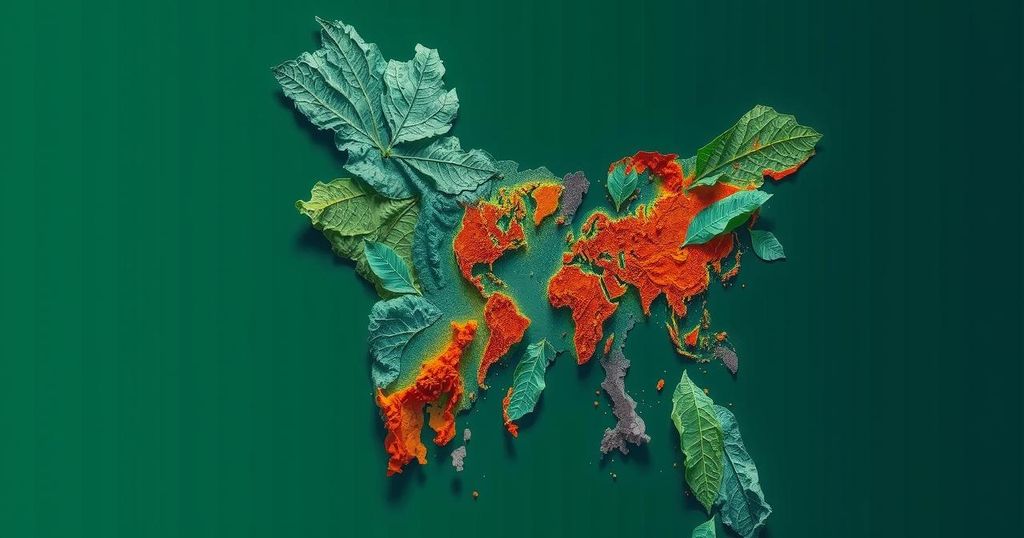Bangladesh faces critical climate challenges, with projections indicating a substantial loss of arable land and rice production due to rising sea levels by 2050. Despite contributing minimally to global greenhouse gas emissions, the country is severely affected by climate change, highlighting a stark disparity in responses to environmental disasters influenced by socioeconomic status. The article emphasizes the need for urgent action from both Bangladeshi authorities and the global community to address these issues equitably and sustainably.
The recent increase in severe weather events, including incessant rain and flash flooding, in Bangladesh has been anticipated by scientific predictions made decades ago regarding climate change. This situation reflects a pressing reality, echoing the urgency of addressing climate impacts as the World Risk Index 2023 highlights Bangladesh ranking ninth in global climate disaster risk. By 2050, it is projected that the nation will lose 30% of its arable land due to rising sea levels. This decline in land will directly impact rice production, a staple food for Bangladeshis, thereby exacerbating food insecurity and potentially leading to famine, elevated unemployment, housing crises, and widespread poverty. Despite contributing minimally to greenhouse gas emissions since its independence in 1971, Bangladesh is feeling the effects of climate change disproportionately. The country is witnessing detrimental outcomes due to the melting Himalayan glaciers, which threaten its monsoon season and cause recurrent floods. While there is an urgent need for effective policy responses to these environmental challenges, the Bangladeshi government has been criticized for its lack of operational strategies. Additionally, political instability in Bangladesh compounds the issue, resulting in inadequate attention to climate crisis policies. This situation is further complicated by the climate politics of wealthier Global North nations, which have historically exploited the Global South. The phenomenon of climate apartheid is becoming evident, with a stark divide in resources and responses to climate disasters. Wealthy countries possess the means to escape the adverse effects of climate change, having accumulated wealth through colonial practices that exploited developing nations like Bangladesh. The disparities in emergency responses to climate crises, as seen in places like Feni and Sherpur, underscore the severity of climate apartheid within Bangladesh. Wealthy areas receive prompt assistance during floods, whereas poorer regions struggle to gain similar attention and support. The article argues that the climate crisis will not impact all communities equitably—its effects will be felt more heavily by marginalized groups. The Industrial Revolution, largely based in Europe and North America, is anchored in a legacy of significant greenhouse gas emissions, with the Global North responsible for approximately 92% of emissions over the past two centuries. Despite their historical contributions to climate change, developing nations often face unfair scrutiny and blame for environmental degradation, while the wealthy continue to hinder the industrial growth of these nations by demanding constraints on their development. While it is essential to reduce global greenhouse gas emissions, constructing viable solutions for developing nations is equally crucial. Such initiatives require financial backing that has been promised by wealthy nations but remains largely unfulfilled. Instead, the Global North has consistently exported blame and criticism rather than vital resources and technology needed for climate adaptation and mitigation. As a result, countries like Bangladesh must prioritize climate change now more than ever, as the United Nations forecasts that between 2030 and 2050, climate-related deaths could reach 250,000 annually.
Bangladesh is facing significant climate-related challenges that have been predicted by scientists for decades. With the World Risk Index ranking Bangladesh as one of the most vulnerable nations to climate disasters, the implications of rising sea levels and extreme weather events are becoming increasingly dire. The country, historically subjected to colonial exploitation, is now one of the foremost examples of how climate change disproportionately impacts developing nations, necessitating urgent interventions and international support in addressing these challenges.
In conclusion, the ongoing climate crisis significantly endangers Bangladesh, with predictions of severe land loss, food insecurity, and poverty looming on the horizon. While this situation is aggravated by a lack of effective policies and political instability within the nation, it is further exacerbated by the historical and ongoing exploitation by wealthier countries. The disparity in responses to climate-related disasters highlights the manifestation of climate apartheid both globally and within Bangladesh itself. It is vital for the international community to fulfill its financial and technological commitments to developing nations to ensure that equitable solutions to the climate crisis can be implemented and that these nations can protect their populations and ecosystems effectively.
Original Source: asianews.network






